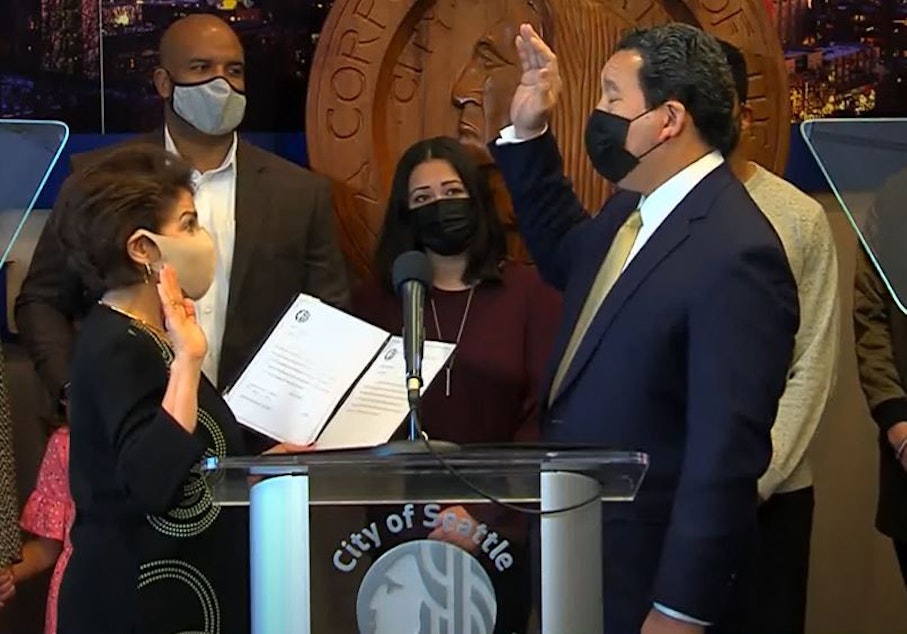Health care and homelessness: Harrell takes first steps as Seattle mayor

Bruce Harrell was sworn in as Seattle’s mayor at a Tuesday morning ceremony (he officially took over on New Year’s Day), after a campaign that promised to move the city more towards the center on key issues including homelessness and public safety.
But Harrell tells KUOW he takes issue with the "moderate" label, when so many of his plans are "progressive." That was the tone Tuesday as Harrell put a handful of issues in the spotlight.
Healthy Seattle Initiative
Harrell's term as mayor will begin with work on a "Healthy Seattle Initiative," a plan to not only provide health care to "all" city residents, but to promote healthy living.
“We'll make sure every resident in our city not only has health care but that they are healthy,” Harrell said.
Sponsored
According to spokesperson Jamie Houson, Harrell "is not suggesting a single payer system for Seattle, but instead looking at filling the gaps for those uninsured through a program potentially modeled after Healthy San Francisco."
In his speech Tuesday, Harrell said the plan itself will take some time to develop, but the goal is to make Seattle the healthiest city in the country.
Homelessness
Homelessness was a key issue during the last election. Harrell spoke about listening to all sides of the issue, and of removing unauthorized encampments, as well as building more emergency housing units.
On Tuesday, Harrell said he would soon issue an executive order that will require a transparent plan on the city’s homelessness response. The goal is to allow residents to look under the hood to measure progress.
Sponsored
Harrell also said he will require the city's public utilities to flag any imminent shut offs of service, such as electricity. With that information, the city can proactively try to address people's needs before they become homeless.
Another executive order will focus on housing affordability and finding ways of adding housing by adding density. This would include a “a full review of the permitting and approval processes."
Labels, moderation, collaboration, and the far left/right
In general, Harrell’s speech stressed how he would govern — and he often used the word “progressive” to describe his approach.
It’s an interesting word choice in that national pundits are comparing Harrell to Black moderates in other major U.S. cities, such as New York’s new Mayor Eric Adams.
Sponsored
Adams also ran on a plan to fund the police, amid calls to defund departments from activists. And like Adams, Harrell faced criticism from the political left.
In Seattle, Harrell ran on moving the city more to the center — the center for a city that already votes very blue.
Speaking with Harrell last week, before he was sworn in, he commented on the labels that have been thrown around during the campaign, such as "moderate" and "progressive."
“My collaborative style, perhaps, could be confused with moderation because I try to spend as much time listening as I do talking,” Harrell said. “And the very loud and vocal far left, I think, often replicate what we see on the far right.”
In Tuesday's speech he further rejected the "moderate" label and called his approach progressive.
Sponsored
“While we talk about being ‘progressive’ or ‘liberal’ or ‘inclusive,’ I have yet to see the Seattle I know we can be," Harrell said.
Police reform
Harrell’s collaborative leadership style will play a role when it comes to Seattle’s stance on policing. The 2021 election came after months of protests for police accountability and calls for police reform, defunding, and even abolition.
Harrell also told KUOW he'd focus on curbing the use of excessive force — a key issue for progressives. But he will also address concerns about Seattle’s rising crime rates, which is a top issue for moderates.
"A safe and supported city employs the right kind, and right number, of police officers,” Harrell said Tuesday. “And establishes unarmed, community-based responders we desperately need to restore trust and street-level safety."
Sponsored
The media
Before closing, Harrell took a moment to address the press. His predecessor, Jenny Durkan, sometimes faced criticism over her relationship with the media, including her "vanishing emails."
“I want to recognize that you have a place in this too,” Harrell said before a crowd of reporters. “The Journalist’s Creed, as written by Walter Williams in 1914, describes that you only write that which you believe to be true in your heart — that you be tolerant, never careless, self-controlled, patient, and respectful. Those are important words for all of us."
KUOW Web Producer Dyer Oxley contributed to this report.

